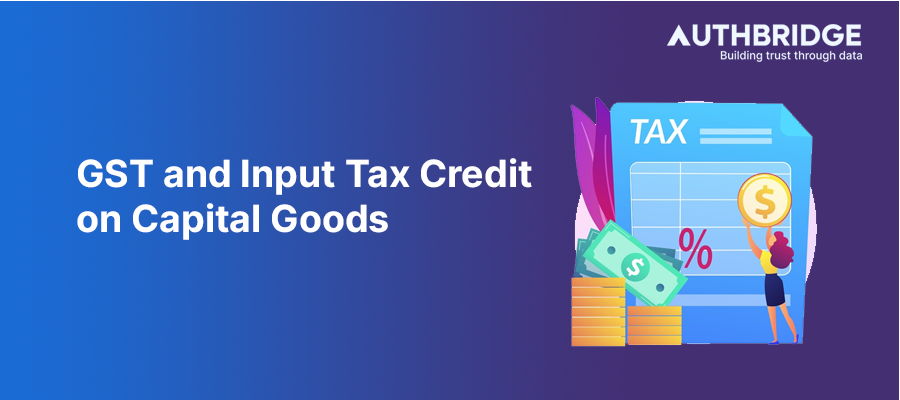Unlocking The Benefits Of Input Tax Credit For Capital Goods Under GST

Introduction to GST ITC on Capital Goods
The Goods and Services Tax (GST) has transformed the tax landscape in India, introducing a more streamlined and unified approach to indirect taxation. One of the cornerstones of this system is the Input Tax Credit (ITC), a mechanism that allows businesses to reduce their tax liability by claiming credit for the tax paid on inputs. This includes capital goods, which are significant for any business's operational and production capabilities. Understanding GST ITC on capital goods, its compliance, and how to claim it is crucial for businesses to optimize their tax benefits and ensure regulatory compliance.
What are Capital Goods?
Capital goods are long-term assets such as machinery, vehicles, equipment, and buildings used in the production of goods or services. Unlike inputs that are consumed in the production process, capital goods are used over several years. The distinction between capital goods and other inputs is fundamental in accounting and tax treatment, especially under the GST regime.
Credit on Capital Goods
When businesses purchase capital goods, they pay GST on these purchases. This GST can be claimed as an input tax credit, which is a significant advantage. However, if depreciation on the GST component of the capital goods has been claimed, the business cannot claim ITC. This provision ensures that double benefits are not availed.
Common Credit and Its Importance
Many businesses use assets for both business and personal purposes. GST allows for the claim of ITC only to the extent of business use. This bifurcation, known as common credit, is crucial for ensuring that ITC claims are accurate and comply with the law. It prevents businesses from claiming tax benefits on personal expenses or exempt supplies.
Claiming ITC on Capital Goods in GST
To harness the full benefits of GST, understanding how to claim ITC on capital goods is vital. This process involves adhering to specific conditions and accurately reporting credits through GST returns.
Conditions for Claiming ITC
The eligibility to claim ITC on capital goods hinges on several conditions:
- Possession of a valid tax invoice or relevant document.
- Receipt of the goods/services.
- The supplier has paid the taxes to the government.
- Filing of GST returns.
Documentation and Compliance
The documentation required for claiming ITC on capital goods includes tax invoices, debit notes, bills of entry, and other specified documents. Proper maintenance and management of these documents are essential for compliance and to support ITC claims.
Process of Claiming ITC
Claiming ITC involves reporting in the monthly GST returns (Form GSTR-3B), where taxpayers must provide a summary of eligible and ineligible ITC. It's crucial that the ITC claimed matches the details in GSTR-2B to ensure compliance and avoid mismatches or disputes.
Compliance for Capital Goods in GST
Compliance in the context of capital goods under GST covers accurate reporting, proper documentation, and adhering to specific regulations related to ITC claims and reversals.
Reporting and Documentation
Businesses must maintain detailed records of capital goods purchases, including GST paid, to claim ITC. These records support the claims made in GST returns and are essential during audits or assessments.
Reversal of ITC
In certain situations, ITC on capital goods must be reversed, such as when goods are used for personal purposes or not paid for within 180 days. Understanding these conditions and accurately calculating reversals is crucial for compliance.
Special Cases of ITC
There are specific scenarios in GST where the rules around ITC for capital goods have unique applications, such as job work and input service distributors (ISD).
ITC for Job Work
Businesses sending goods for job work can claim ITC on the tax paid on those goods. However, certain conditions apply, such as the requirement for goods to be returned within specific timelines.
ITC Provided by ISD
Input Service Distributors play a vital role in distributing ITC on services among various branches of a business. The rules around ISD and how they allocate ITC for capital goods are crucial for businesses with multiple branches.
Conclusion
The GST framework offers significant benefits through the ITC mechanism, especially concerning capital goods. Businesses must navigate the complexities of claiming ITC, ensuring compliance, and understanding the nuances of special cases. Proper management of ITC on capital goods not only aids in optimizing tax liabilities but also strengthens compliance with GST laws, ultimately contributing to the financial health and operational efficiency of businesses.
Meta- Maximize benefits from GST input tax credit on capital goods purchases
Category

Abhinandan Banerjee
(Associate Manager - Marketing)
Abhinandan is a dynamic Product and Content Marketer, boasting over seven years of experience in crafting impactful marketing strategies across diverse environments. Known for his strategic insights, he propels digital growth and boosts brand visibility by transforming complex ideas into compelling content that inspires action.



